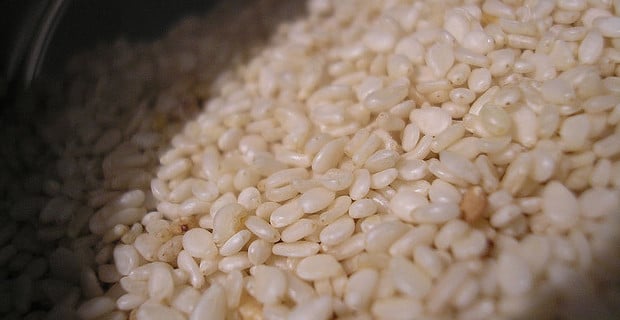
Sometimes size doesn't matter. Sesame seeds prove that even the smallest of things can pack a powerful punch. With their historical standing as the first condiment, and their enduring power to enrich even the most mundane foods today, sesame seeds hide behind their small stature. Though you might be thinking only of the leftover take-out sesame chicken still sitting in your fridge, the sesame seed has been around longer than even chicken. In fact, the earliest record of sesame was in a myth of Assyrian origin that claims a dark sesame wine was had by the gods the night before they created the Earth.
Sesame seeds are used to make sesame oil, which can be plain or from toasted sesame seeds, which yields a rich flavor that is amazing drizzled over cold vegetables, fish, and salads. The oil is the primary oil used in most Eastern cooking, though it also shows up in southern American cuisine due to the African presence in the area. Sesame seeds were brought to America from Africa, the place where the seeds originated. Arabs also used the sesame seed and its oil widely in cooking. The phrase "open sesame" originated there, referring to how the sesame seed pod bursts open when mature.
Read more about other healthy seeds
Sesame seed varieties include yellow, black, white and red, and pale seeds are milder in flavor. The sesame seed is high in fat-50 percent oil by weight-and needs to be stored in the refrigerator to prevent rancidity. Sesame seeds are high in antioxidants and they contain sesamin and sesamolin, two substances that studies show have cholesterol-lowering effects and blood pressure reduction in humans. Sesame seeds are also a source of copper, which helps with growth and maintenance of bone and connective tissues, and manganese, which promotes bone and cartilage health. Though they're nothing like turkey in appearance, they too are a rich source of trytophan, a precursor to serotonin, which regulates sleep. They also contain a dose of calcium, iron and some zinc. All that pumping through those little seeds!
I suggest you "open sesame" a few times a week, exploring the many ways sesame can add flavor and texture to a meal. Though I do not suggest eating buckets full everyday, they are
worthwhile to add to a well-balanced and varied diet. Plus, they're fun
to sprinkle on foods for some crunch, not to mention the pleasing visual
effect of speckles of color. Many people enjoy hummus and dressings that contain Tahini, a paste made from sesame seeds.
Light sesame oil has a high smoke point (420°F), making it excellent
for cooking, and its high antioxidant content prevents it from spoiling.
But toasted sesame oil has a lower smoke point and will turn rancid
much more quickly, so it should be stored in the refrigerator. Toasted
sesame oil also has more intense nutty flavor, so it is best used as a
finishing oil. Try toasted sesame oil over blanched broccoli, cold salmon salads, toasted with soba or rice noodles, drizzled over roasted or poached chicken, or with grilled shrimp. I love it over any and all steamed vegetables, with a hearty sprinkling of sesame seeds for texture and contrast.
Sesame seeds are a great addition to even the most basic of salads, and are delicious atop smoked salmon and cream cheese bagels. Sprinkle them into biscuits or muffins, mix them with breadcrumbs to coat shrimp, or crust tuna with the seeds for some crunch. For a fresh sandwich, layer cucumbers, avocado, tomato, a fresh, soft cheese (cream cheese works), and top with a tablespoon of sesame seeds.
Recipe: Sauteed Green Beans with Walnut Oil and Toasted Sesame Seeds
Tahini can be combined into myriad sauces, spread on a bagel and drizzled with honey for a sweet bite, or combined with miso paste to make a new spread. Or just enjoy it in a delicious hummus.
Image: Nate Steiner




